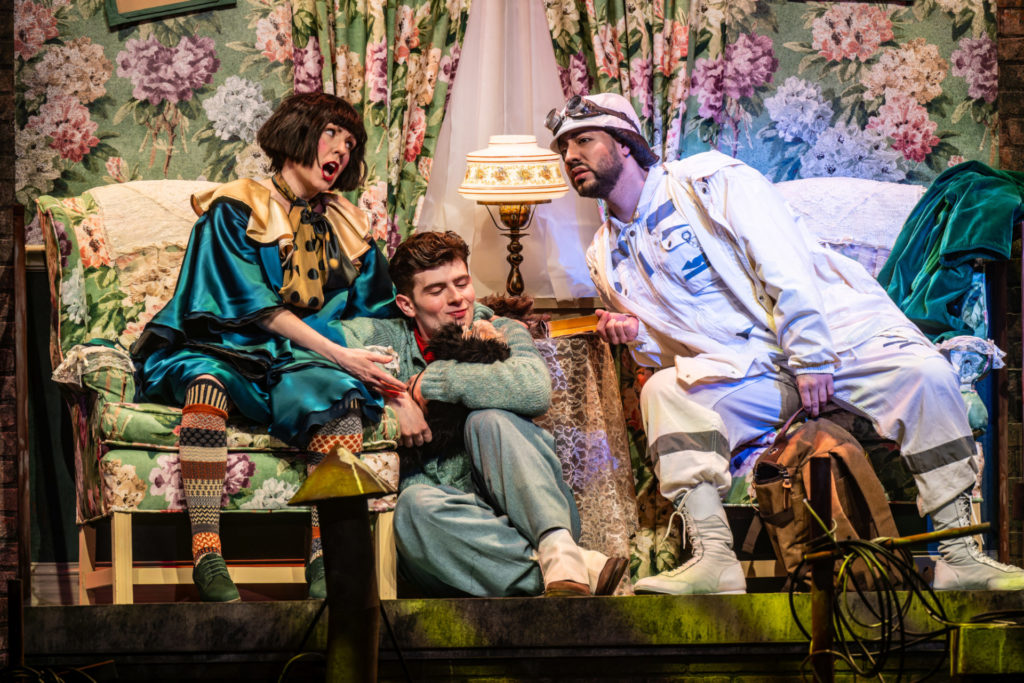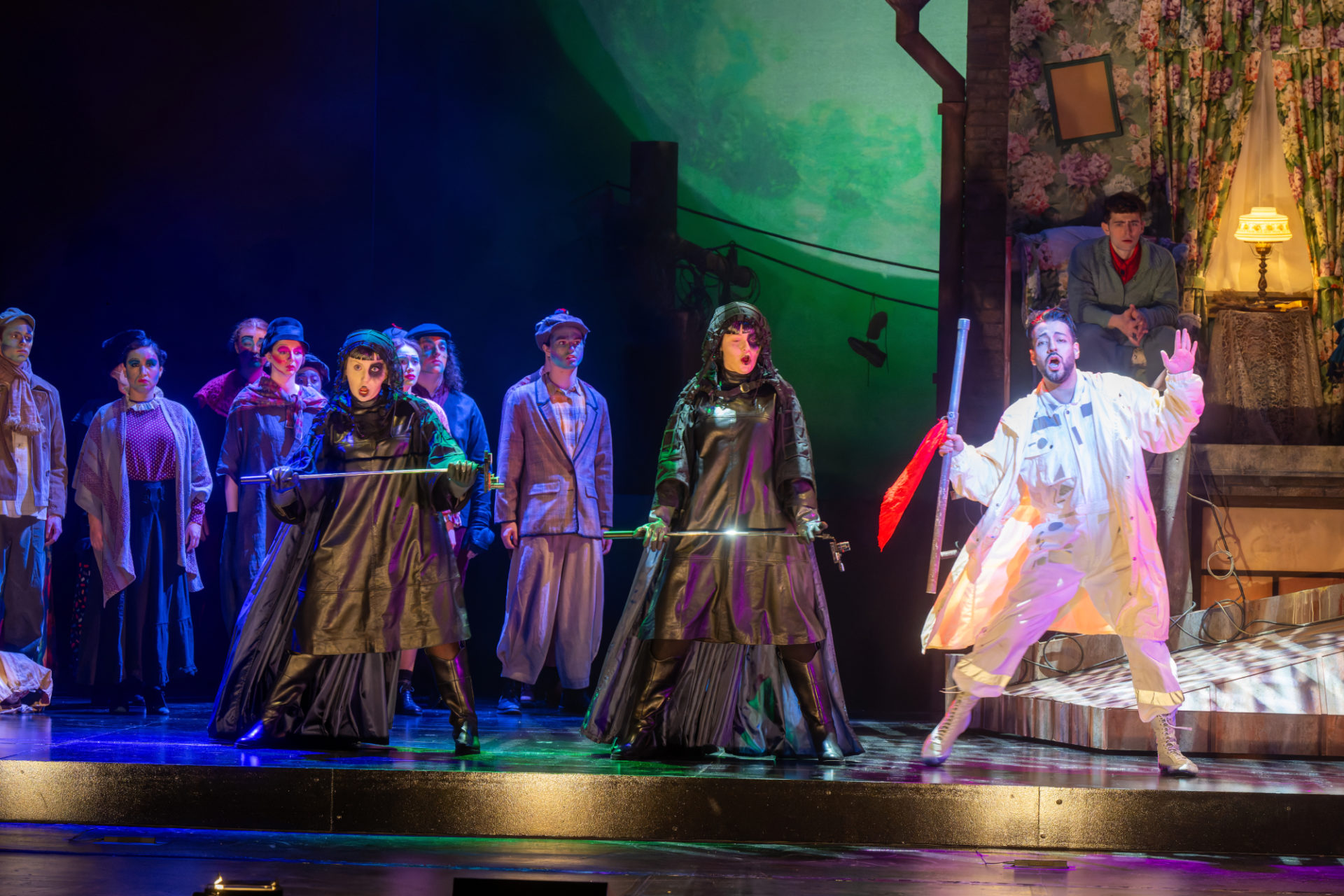This week, the Lyric Theatre at Illinois put on a production of Black Square, an opera with music by Ilya Demutsky, and a libretto by Igor Konyukhov and Olga Maslova. The opera is based on the Russian Futurist opera from 1913 entitled Victory Over the Sun. I’ve long had an interest in Russian Futurism, so I jumped at the chance to go see this opera and to witness how Demutsky, Konyukhov, and Maslova were inspired by an opera so deeply rooted in a vision of the future from early 20th century Russia and Ukraine—a period rife with then-new technologies such as trains, automobiles, and film cameras—into the 21st century culture of the US.
Before we dive into Black Square, I think it’s important to turn the clock back a bit toward Victory Over the Sun. With music by Mikhail Matyushin and a libretto written by the poets Aleksei Kruchenykh and Velimir Khlebnikov, and stage design by the artist Kazimir Malevich, the opera was a collision of various ideas that were prominent in avant-garde art circles at the turn of the 20th century. Kruchenykh’s libretto featured lyrics heavily that put his concept of zaum into use, the “transrational” language invented by him and Khlebnikov, consisting of isolated sounds without meaning. Meanwhile, part of the set design featured an early version of Malevich’s iconic painting Black Square, which is where our opera gets its name. Similar to the poets’ linguistic experimentation, Malevich’s painting was a symbol of artistic “feeling” rather than a depiction of an object. An abyss to stare into and feel small.
Our opera, Black Square, heavily draws upon the earlier opera’s artistic themes, especially regarding language. As such, the plot is minimal by design. A husband and wife, a group of revelers, and an anguished time traveler are subjected to a revolution that kills the sun, thus casting aside the hierarchy of shade. In the second act, everyone is enthralled by The Beautiful One, and dissenters are thrown into The Memory Eraser. The opera presents us with radical post-apocalyptic and post-revolutionary visions. The performance shows us the abyss of Malevich’s painting come to life and played out on stage, wrapped in a layer of playful nonsense.

My favorite parts of this performance were the costumes, designed by the multi-talented Maslova, and the sets by Scott C. Neale. Eschewing the stark, geometric avant-garde aesthetics of Futurism, they embraced a lavish kitsch, in keeping with the theme absurdity. Kitschy standouts for me were the Diva’s dress of trash, The Beautiful One’s campy-masculine physique, and the screens playing strange videos during the second act. This cacophony of things and visuals grabbed my attention throughout the performance and provided a visual for the chaos of apocalypse reflected in the zaum-inspired libretto of nonsense-words. Equally excellent were the performers. Not a single one of them lacked in talent or dedication, but Héctor Camacho-Salazar as the Time Traveler, and Mia Love as the Diva were particular standouts.
While the opera focuses on themes of revolution and apocalypse, there’s a paradoxical inertia that permeates its themes. As the Diva sings, the world ends, “but we remain forevermore.” While the Futurist ideals of Victory Over the Sun were steeped in the inherent, yet triumphant violence of overthrowing the status quo, the Black Square opera seems to have a more ambivalent perspective. The revolution—or apocalypse—is an undesired intrusion into banal daily life yet defined by its absurd and never-ending nature. With its kitsch and camp, this production wraps violence in paradoxically artful silliness. This absurdity strips the revolution of its power, serving as a reminder of its cyclical inertia.
I’m not a musician, but I was intrigued by how the score reflected these themes. I asked a friend if she could share her thoughts, and she mentioned that as the language broke down, the music became more coherent. She also pointed out the shifting leitmotifs, the individual musical identities were broken down and altered, mirroring the libretto. This observation was particularly intriguing. There’s a balance occurring between the music and the spoken word during the opera, as though the scales are being tipped in one direction or another. Coupled with the visual chaos of the costumes and sets, we in the audience are subject to a counterbalance to the aural sensation.
Black Square utilizes a lot of nonsense-syllables, similar to Kruchenykh’s zaum language. But while Kruchenykh and Khlebnikov were trying to break down language to its primordial roots, a reflection of feeling similar to Malevich’s artistic goals. But in this play, Konyukhov and Maslova seemed to do something slightly different. The use of “LOL” was especially interesting. For most of the opera, the letters were sung individually: L-O-L. But the final lyrics, sung by the Diva, were the three letters individually, followed by the letters as one syllable: lol. As we know, in contemporary English, these letters aren’t meaningless sounds, they’re an expression of laughter and enjoyment. In yet one more way, were reminded of the absurdity of this apocalypse. The Diva’s final lol is a wink to the audience, a cheeky invitation to join in the chaos.
As the curtains closed and the lights came on, I found myself with a lot to think about after Black Square ended. One of my lingering impressions of the opera was its presentation of the idea of apocalypse, of societal collapse. I remember thinking about this when I first learned about Victory Over the Sun, and the artistic and literary milieu that brought that opera to life and defined its themes. As we know, there actually was an apocalypse a few short years after that play’s premiere in 1913. The October Revolution and the Civil War that followed set the course of society in a drastically different direction. I wonder, however, how our world will end—climate change, nuclear fallout, political instability? Our future often looks bleak. Yet, Black Square calls upon us to greet the apocalypse with a laugh. Whose laugh, I wonder? Is it the laughter of defiance against the inevitable, or perhaps the laughter of madness in the face of absurdity? Maybe it’s a sarcastic peal aimed at our own folly. Regardless, this opera reminds us that there is power in finding humor in the face of the unknown.








